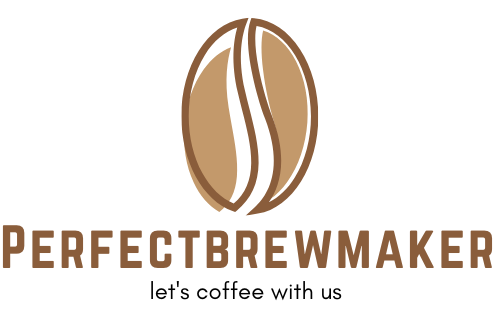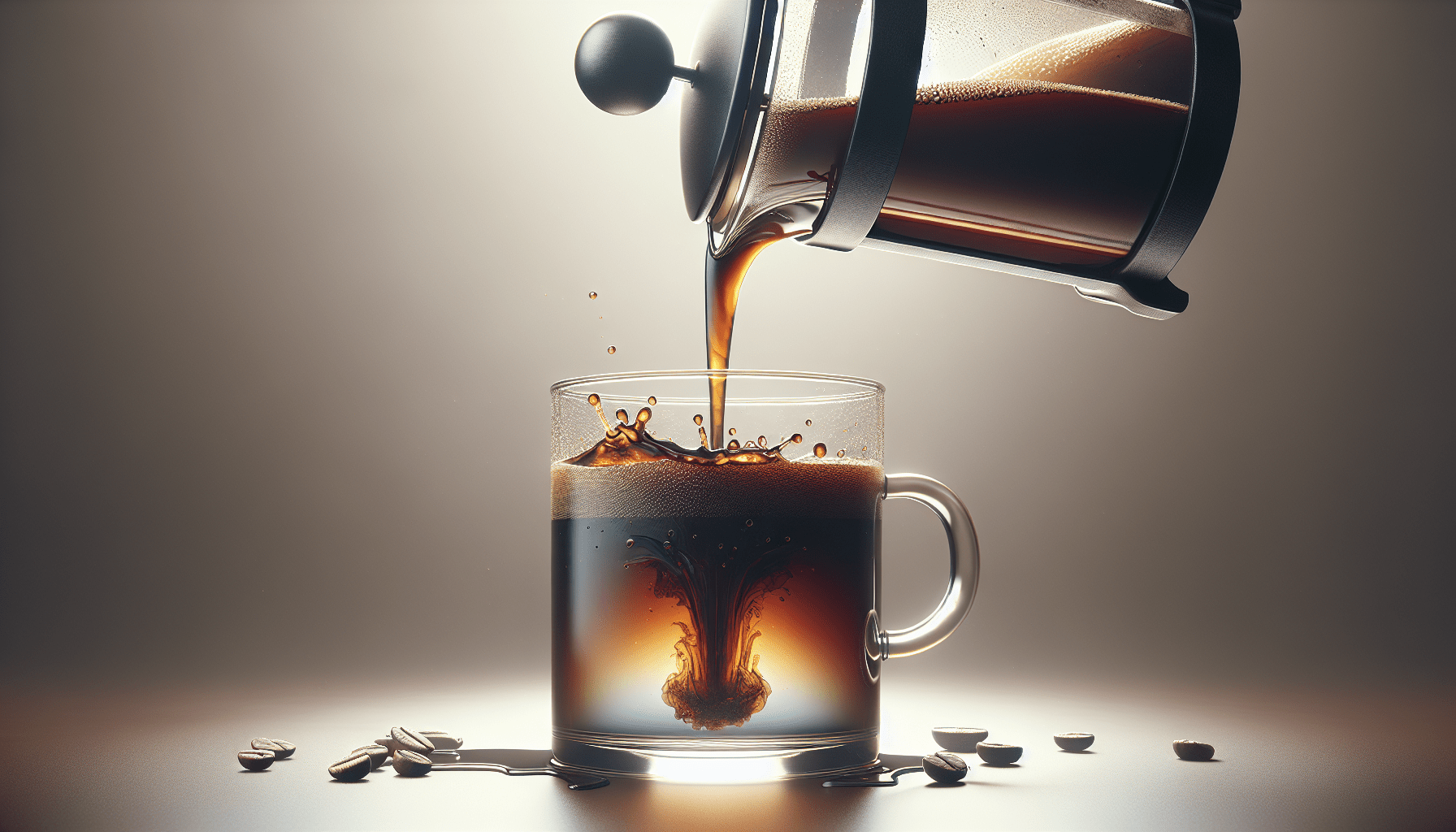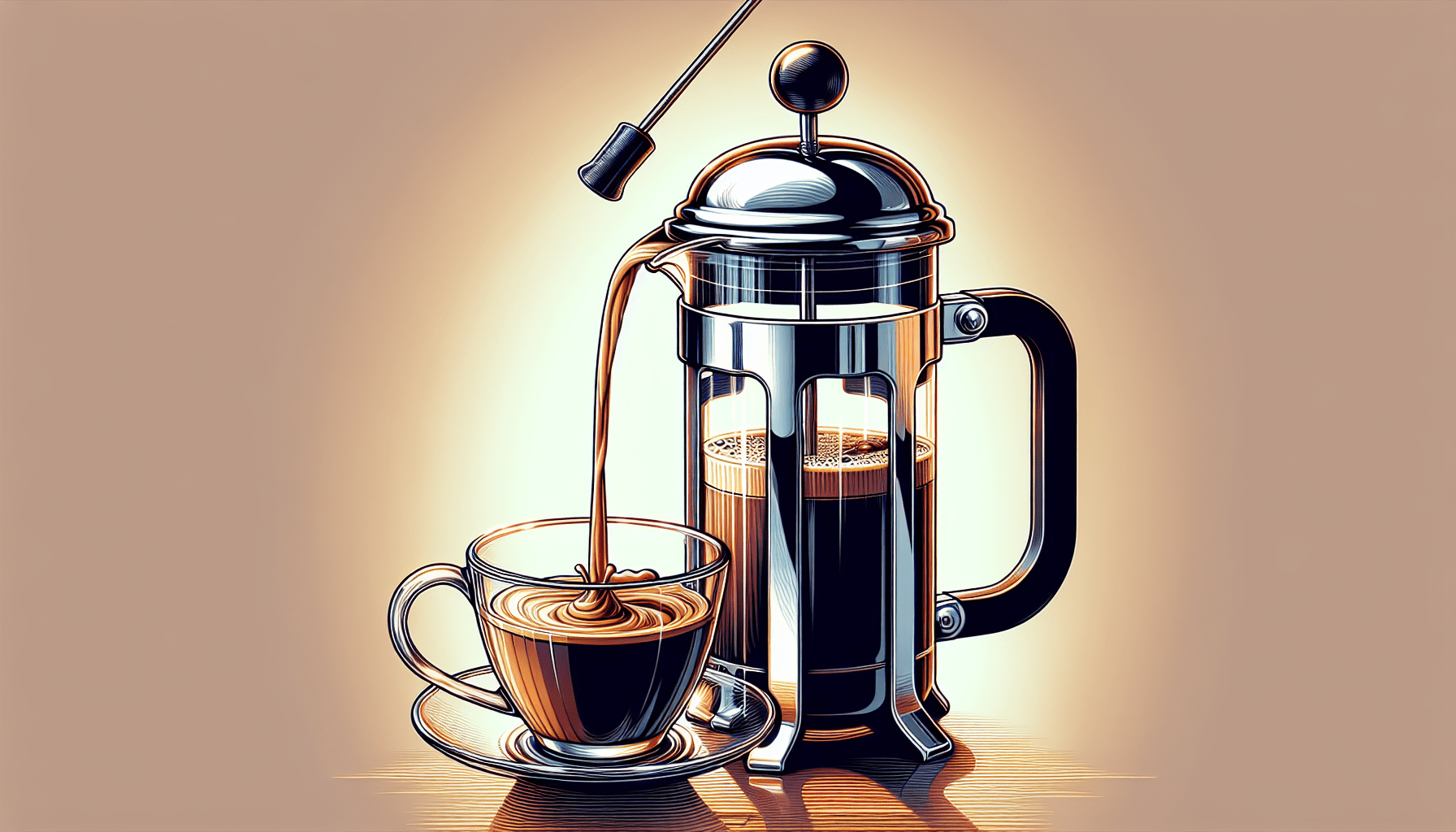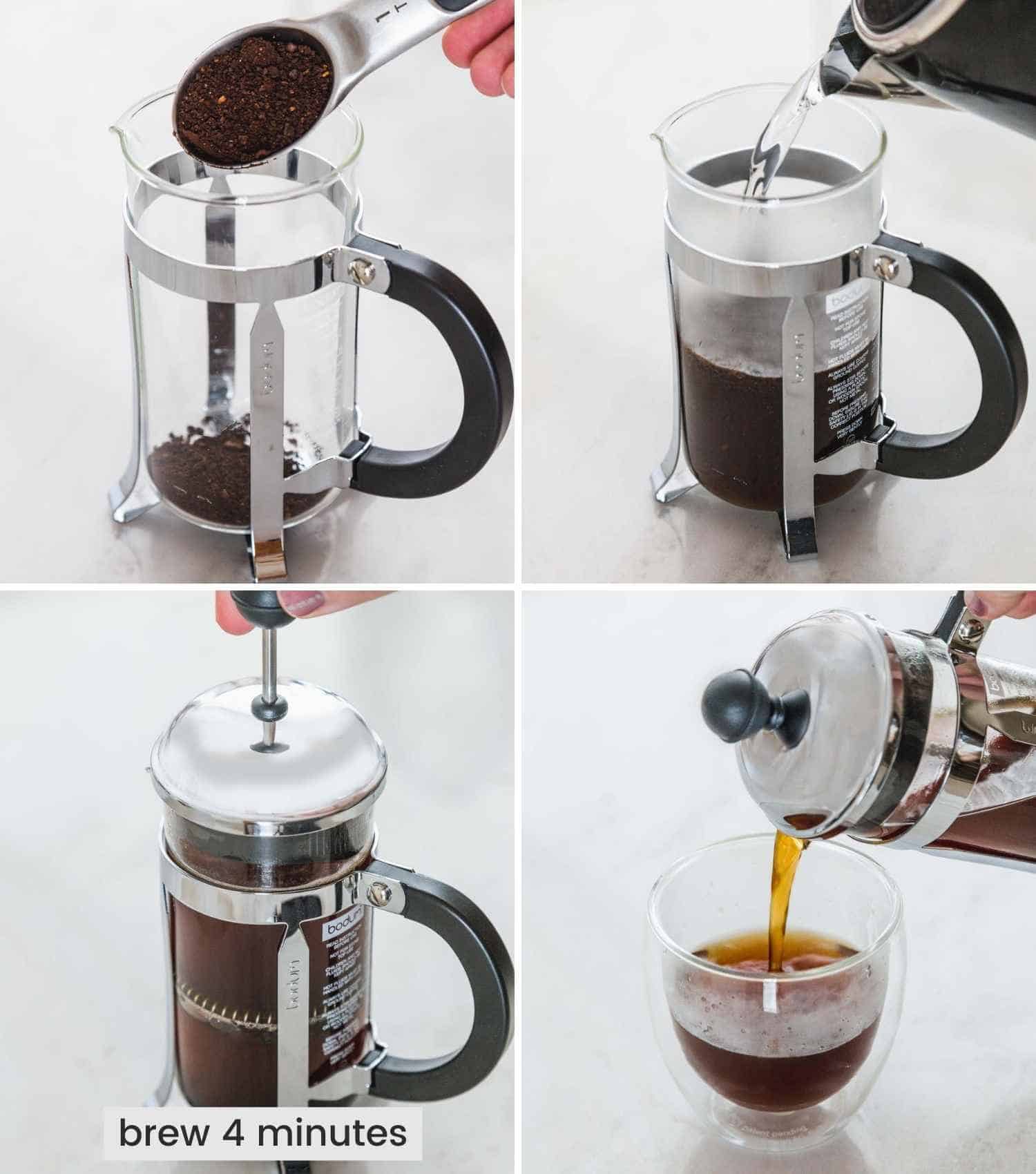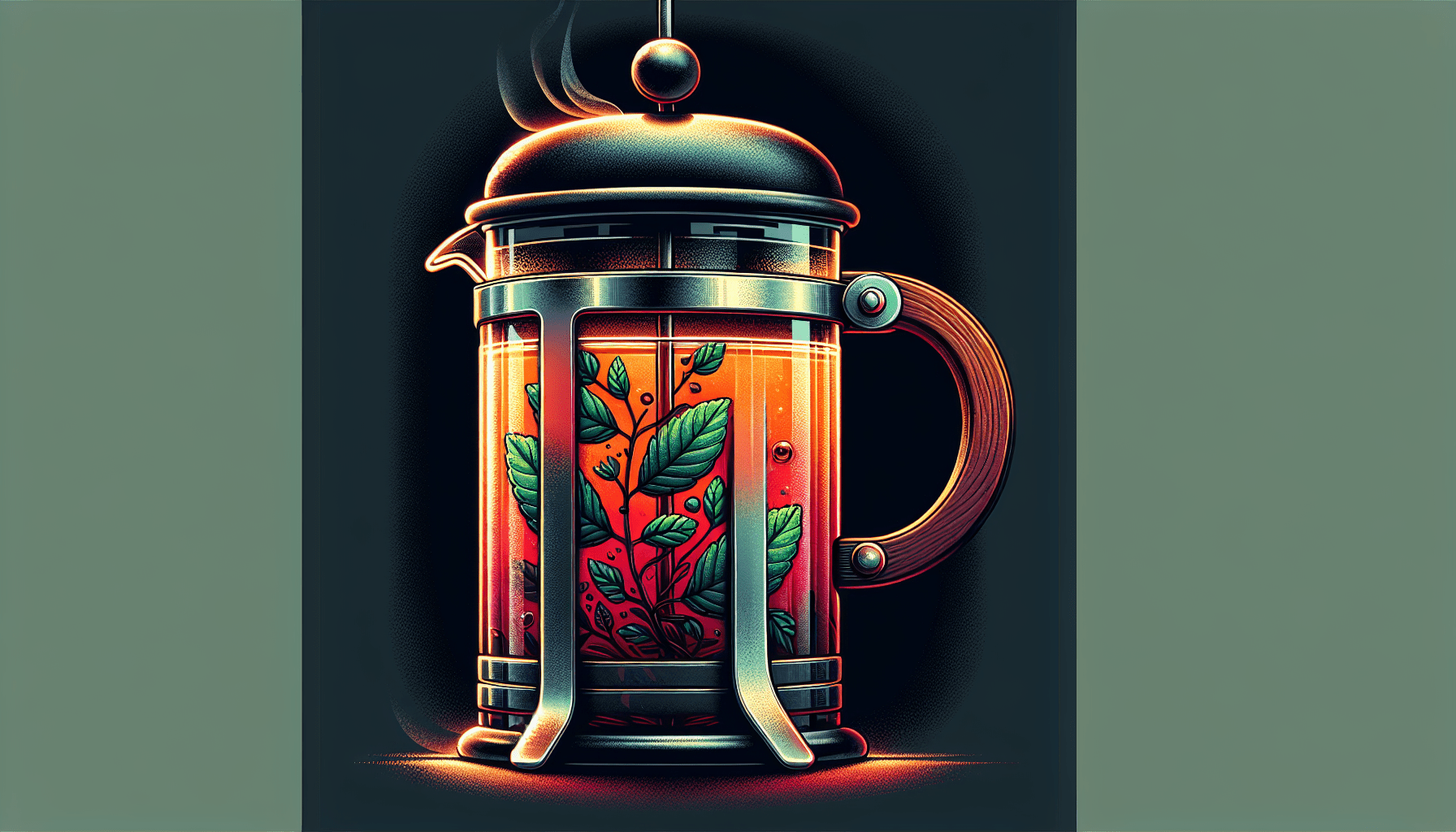If you’re a coffee lover like me, you’re constantly on the lookout for new and exciting ways to enjoy your favorite beverage. Well, look no further! Today we’re exploring the possibility of creating coffee concentrates with a French press. Imagine the rich and intense flavor of your beloved brew, but in a more concentrated form that can be used for various recipes and indulgent coffee creations. Whether you’re a seasoned coffee aficionado or just curious about the possibilities, let’s dive into the world of coffee concentrates and see if a French press can bring them to life.
What is a French Press?
Definition and design of a French press
A French press, also known as a press pot or a plunger pot, is a popular coffee brewing device that consists of a glass or stainless steel container with a plunger and a mesh filter. It provides a simple and effective method for brewing coffee, allowing you to extract the full flavor and aroma from the coffee grounds.
The design of a French press typically includes a cylindrical carafe, a plunger with a mesh filter, and a lid. The carafe is made of heat-resistant glass or stainless steel, which helps in retaining heat during the brewing process. The plunger has a handle at the top and a mesh filter attached to the bottom, which separates the brewed coffee from the grounds. The lid is used to cover the carafe during brewing, helping to maintain the temperature and prevent any unwanted brewing flavors.
How to use a French press
Using a French press is a relatively simple process. Here’s a step-by-step guide to help you brew your coffee:
- Start by heating water to the desired temperature. The optimal temperature for brewing coffee with a French press is around 195-205°F (90-96°C).
- Grind your coffee beans to a coarse consistency. This is important to prevent the grounds from passing through the mesh filter.
- Remove the plunger and add the desired amount of coffee grounds to the empty carafe. As a general guideline, use 1 tablespoon of coffee grounds for every 4 ounces of water.
- Pour the heated water over the coffee grounds in the carafe. Make sure to saturate all the grounds and stir gently to ensure uniform extraction.
- Place the plunger on top of the carafe, but do not plunge yet. Let the coffee steep for about 4 minutes to allow the flavors to develop.
- Slowly press the plunger down, using even pressure. This will separate the coffee grounds from the brewed coffee.
- Once you have pressed the plunger to the bottom, your coffee is ready to be poured and enjoyed.
Advantages of using a French press for brewing coffee
Using a French press for brewing coffee offers several advantages:
- Full-bodied flavor: The immersion brewing method employed by a French press allows for maximum extraction of the coffee’s oils, resulting in a rich and flavorful cup of coffee.
- Customizable strength: With a French press, you have control over the strength of your coffee. By adjusting the coffee-to-water ratio and the brewing time, you can create a brew that suits your taste preferences.
- No need for paper filters: Unlike other brewing methods that require paper filters, a French press uses a mesh filter. This eliminates the need for disposable filters and allows the coffee’s natural oils and flavors to pass through into the final cup.
- Simple and user-friendly: Brewing coffee with a French press is straightforward and requires minimal equipment. It is a great option for both seasoned coffee enthusiasts and beginners who want to enjoy a delicious cup of coffee without any complicated techniques.
Understanding Coffee Concentrates
Definition and characteristics of coffee concentrates
Coffee concentrates are highly concentrated forms of brewed coffee, which are created by extracting the coffee’s flavors and aromas in a more intense manner compared to traditional brewing methods. They can be used as a base for various coffee beverages, providing a bold and robust coffee flavor.
Coffee concentrates typically have a higher coffee-to-water ratio than regular drip coffee, resulting in a stronger and more concentrated flavor profile. They can be brewed using different methods, such as cold brew, espresso, or even with a French press.
Characteristics of coffee concentrates include a higher caffeine content, a more intense coffee flavor, and the ability to be diluted with water or other liquids to create a customized coffee beverage.
Different methods of making coffee concentrates
There are several methods for making coffee concentrates, each offering a unique flavor profile:
- Cold Brew: Cold brewing involves steeping coarse coffee grounds in cold water for an extended period, usually 12-24 hours. This slow and gentle extraction process results in a smooth, low-acidity coffee concentrate.
- Espresso: Espresso is a highly concentrated form of coffee that is brewed under pressure using finely ground coffee and hot water. It produces a strong and intense flavor, making it a popular choice for making coffee concentrates.
- French Press: Although traditionally used for brewing regular coffee, a French press can also be used to make coffee concentrates. By adjusting the grind size and brewing time, you can create a concentrated coffee that can be diluted to your desired strength.
Benefits of using coffee concentrates
Using coffee concentrates offers several benefits:
- Convenience: Coffee concentrates can be prepared in advance and stored in the refrigerator for an extended period. This makes them a convenient option for those who want to have coffee readily available without the need for brewing a fresh cup each time.
- Versatility: Coffee concentrates can be used as a base for various coffee beverages, allowing for creativity and experimentation. They can be diluted with water, milk, or other liquids to create iced coffee, lattes, mochas, or even coffee-flavored desserts.
- Strong and intense flavor: Coffee concentrates provide a bold and robust coffee flavor that can be customized to suit individual preferences. By diluting the concentrate to the desired strength, you have control over the intensity of your coffee.
Brewing Coffee with French Press
Standard method of brewing coffee with a French press
The standard method of brewing coffee with a French press, as mentioned earlier, involves adding coffee grounds to the carafe, pouring hot water over them, allowing them to steep, and finally pressing down the plunger to separate the grounds from the brewed coffee. This method produces a regular strength cup of coffee, but can a French press also be used to make coffee concentrates?
Factors that affect the strength of coffee brewed in a French press
The strength of coffee brewed in a French press can be influenced by several factors:
- Coffee-to-water ratio: Adjusting the amount of coffee grounds and water used in the brewing process can significantly impact the strength of the final cup. Increasing the coffee-to-water ratio will result in a stronger brew.
- Grind size: The size of the coffee grounds affects the rate of extraction. Coarser grounds lead to a slower extraction, while finer grounds extract more quickly. A finer grind size can contribute to a stronger cup of coffee.
- Brewing time: Allowing the coffee to steep for a longer duration increases the extraction of flavors and results in a stronger brew. However, over-extraction can lead to a bitter taste, so it’s important to find the right balance.
- Water temperature: The temperature of the water used for brewing also plays a role in the extraction process. Using water that is too hot can result in over-extraction and a bitter taste, while water that is too cold may not extract enough flavors.
Can a French press be used to make coffee concentrates?
Although a French press is primarily designed for brewing regular strength coffee, it can also be used to make coffee concentrates. By adjusting certain variables, such as the grind size, brewing time, and coffee-to-water ratio, you can achieve a more concentrated brew.
Advantages and disadvantages of using a French press for making coffee concentrates
Using a French press for making coffee concentrates has its advantages and disadvantages:
Advantages:
- Convenience: A French press is a versatile brewing device that many coffee enthusiasts already have in their homes. It eliminates the need for additional equipment that may be required for other coffee concentrate methods.
- Customization: By adjusting the variables mentioned earlier, you have control over the strength and flavor of your coffee concentrate. This allows you to tailor the concentrate to your personal preferences.
- Cost-effective: Compared to other methods like espresso machines, using a French press is a more affordable option for making coffee concentrates.
Disadvantages:
- Limited capacity: French presses typically have a smaller capacity compared to other brewing devices. This may be a limitation if you plan on making larger batches of coffee concentrate.
- Extraction consistency: Achieving consistent results with a French press can be more challenging compared to dedicated coffee concentrate methods like espresso. It may require some experimentation to find the right variables for your desired coffee concentrate.
Making Coffee Concentrates with a French Press
Step-by-step guide to making coffee concentrates with a French press
To make coffee concentrates with a French press, follow these steps:
- Adjust the grind size of your coffee. To achieve a more concentrated brew, a finer grind size is recommended.
- Increase the coffee-to-water ratio. Use more coffee grounds per ounce of water to create a stronger coffee concentrate. Experiment with different ratios to find the one that suits your taste.
- Preheat your French press by adding hot water to the carafe and letting it sit for a minute. This helps in maintaining the brewing temperature.
- Discard the preheating water and add the desired amount of coffee grounds to the empty carafe.
- Pour hot water over the coffee grounds, saturating them evenly. Use water at a temperature between 195-205°F (90-96°C) for optimal extraction.
- Stir gently to ensure uniform extraction and then place the lid on the carafe to retain heat.
- Let the coffee steep for a longer duration than the standard brewing method. This may vary depending on personal preference, but anywhere from 5-10 minutes is a good starting point.
- Slowly press down the plunger to separate the coffee concentrate from the grounds. Apply even pressure to avoid any grounds passing through the mesh filter.
- Serve the coffee concentrate as desired, whether that be as a concentrated shot or diluted with water or milk.
Adjusting the grind size for making coffee concentrates
The grind size plays a crucial role in extracting flavors and achieving the desired concentration of your coffee. For making coffee concentrates with a French press, a finer grind size is recommended. However, it’s important to find the right balance to prevent over-extraction or clogging of the mesh filter. Experiment with different grind sizes and observe how they affect the strength and flavor of the coffee concentrate.
Choosing the right coffee-to-water ratio for concentrates
The coffee-to-water ratio is another essential factor in creating coffee concentrates with a French press. Increasing the amount of coffee grounds per ounce of water will result in a stronger, more concentrated brew. Start by using a higher coffee-to-water ratio and adjust it according to your taste preferences. Remember to keep track of the ratio you use to replicate your favorite concentrate in the future.
Brewing time and temperature for coffee concentrates in a French press
When making coffee concentrates with a French press, the brewing time and temperature should be adjusted to ensure optimal extraction. Increase the brewing time compared to the standard method, allowing the coffee grounds to steep for a longer duration. This allows for a greater extraction of flavors and more concentrated coffee.
As for water temperature, it is recommended to use water between 195-205°F (90-96°C) for brewing coffee concentrates. Hot water aids in extracting the coffee’s flavors and ensures a more robust extraction, resulting in a stronger concentrate.
Tips and tricks for achieving the best results
Here are some tips and tricks to help you achieve the best results when making coffee concentrates with a French press:
- Use freshly roasted and high-quality coffee beans. The quality of the beans will greatly impact the flavor and richness of your coffee concentrate.
- Experiment with different variables, such as grind size, brewing time, and coffee-to-water ratio, to find your preferred concentration and flavor profile.
- Take note of your measurements and keep a record of the variables you used for future brews.
- Consider investing in a burr grinder to achieve consistent and precise grind sizes. This will help in controlling extraction and flavor consistency.
- When serving the coffee concentrate, adjust the dilution to your preference. You can dilute it with water, milk, or other liquids to create a beverage that suits your taste.
Using Coffee Concentrates
Different ways to use coffee concentrates
Coffee concentrates offer a world of possibilities when it comes to creating different coffee-based beverages. Here are some popular ways to use coffee concentrates:
- Diluted with hot water: Simply dilute the coffee concentrate with hot water to create a regular cup of coffee. The level of dilution can be adjusted according to personal preference.
- Diluted with cold water or milk: Combine the coffee concentrate with cold water or milk, and serve over ice for a refreshing iced coffee.
- Mixed with milk or creamer: Use the coffee concentrate as a base for lattes, cappuccinos, or other milk-based drinks. Adjust the amount of concentrate and milk according to your desired flavor and strength.
- Added to baked goods: Coffee concentrates can add a rich, coffee flavor to baked goods like cakes, muffins, or cookies. Incorporate the concentrate into the recipe as a substitute for some or all of the liquid.
Diluting coffee concentrates for regular coffee
If you have brewed a concentrated coffee with a French press and would like to dilute it for a regular cup of coffee, simply add hot water to the concentrate. Start with a small amount of water and adjust according to your preferred strength. This allows you to customize your coffee to match your desired taste.
Recipes for using coffee concentrates in various beverages
-
Iced Coffee:
- Ingredients:
- 1 part coffee concentrate
- 2 parts cold water or milk
- Ice cubes
- Optional: sweetener, creamer, or flavorings of your choice
- Instructions:
- Combine the coffee concentrate and water or milk in a glass.
- Stir well to ensure proper mixing.
- Add ice cubes and any desired sweeteners, creamers, or flavorings.
- Enjoy your refreshing iced coffee!
- Ingredients:
-
Coffee Martini:
- Ingredients:
- 2 oz coffee concentrate
- 2 oz vodka
- 1 oz coffee liqueur
- Ice cubes
- Coffee beans for garnish
- Instructions:
- Fill a cocktail shaker with ice cubes.
- Add the coffee concentrate, vodka, and coffee liqueur.
- Shake vigorously for about 15 seconds.
- Strain the mixture into a martini glass.
- Garnish with coffee beans.
- Savor your elegant coffee martini!
- Ingredients:
Comparison with Other Brewing Methods
Comparison of flavors and strengths between French press and other brewing methods
When comparing the flavors and strengths between a French press and other brewing methods, it’s important to note that each method produces a unique taste profile.
French press coffee typically has a full-bodied and robust flavor due to the immersion brewing process, which allows for maximum extraction of oils and flavors from the coffee grounds. It tends to have a richer mouthfeel and can highlight the subtle nuances of the coffee beans.
In comparison, drip coffee brewed with a standard coffee maker may have a cleaner and lighter taste, as it uses a paper filter that removes some of the oils and sediment present in the coffee. This can result in a smoother cup, but with potentially less complexity.
Espresso, on the other hand, offers a concentrated and intense flavor profile. It is typically bolder and more robust than a French press coffee and is the base for many specialty coffee drinks. Espresso extraction involves high pressure and finely ground coffee, resulting in a strong and complex flavor.
Comparison of brewing time and convenience
When it comes to brewing time, a French press offers a relatively quick method. It typically takes around 4-5 minutes to brew a cup of coffee using a French press. This makes it a convenient option for those who want a quick and easy brewing process.
Drip coffee makers, depending on the brewing capacity, may take slightly longer due to the automatic brewing process. However, they offer the convenience of being able to set a timer and have the coffee ready when you wake up or come home.
Espresso machines generally have a longer brewing time, as the extraction process involves high pressure and requires careful preparation. This can make them less convenient for those seeking a quick cup of coffee.
Comparison of equipment and cost
In terms of equipment, a French press is relatively affordable and requires minimal maintenance. It consists of a carafe, plunger, and mesh filter, making it easy to clean and store. French presses are available in a range of sizes and materials, allowing you to choose the one that suits your needs and budget.
Drip coffee makers can vary in terms of features and cost. Basic models are relatively affordable, while more advanced machines with additional features, such as programmability and grinding capabilities, can be more expensive.
Espresso machines are typically the most expensive option among the three brewing methods. They require more complex equipment, such as a machine, grinder, and potentially additional accessories. The cost of espresso machines can vary significantly depending on the features and quality desired.
Factors to Consider
Personal preference for coffee flavor and strength
When deciding on the brewing method for your coffee, personal preference plays a vital role. Consider the flavors and strengths that you enjoy the most. If you prefer a bold and full-bodied coffee with rich flavors, a French press may be the ideal option. If you appreciate a smoother and more delicate cup with less sediment, drip coffee makers or alternative methods like pour-over might be more suitable.
Equipment availability and budget
Consider the equipment you already have or are willing to invest in. If you already own a French press, using it to make coffee concentrates can be a cost-effective option. If you’re considering purchasing new equipment, assess your budget and choose a brewing method that aligns with it. French presses are generally more affordable compared to drip coffee makers and espresso machines.
Time and effort required for brewing
Evaluate the time and effort you are willing to dedicate to your coffee brewing routine. French press brewing is relatively quick and straightforward, making it convenient for those with busy schedules. Drip coffee makers offer the convenience of pre-programming and automatic brewing, while espresso machines often require more time and skill for preparation and cleaning.
Recommended French Press Brands for Making Coffee Concentrates
Top-rated French press brands
There are several reputable French press brands available that are known for their quality and durability. Some top-rated brands include:
- Bodum: Bodum is a well-known manufacturer of French presses and offers a wide range of sizes and styles to suit different needs and preferences. Their products are recognized for their sleek design and reliable performance.
- Frieling: Frieling specializes in high-quality French presses made of stainless steel. They are known for their durability and heat retention properties, providing excellent brewing consistency.
- Espro: Espro focuses on innovative design and functionality, offering French presses with double microfilters for enhanced flavor clarity. Their products are popular among coffee enthusiasts seeking a premium brewing experience.
Features to look for when choosing a French press for making coffee concentrates
When selecting a French press specifically for making coffee concentrates, consider the following features:
- Capacity: Choose a French press with a capacity that aligns with your brewing needs. If you plan on making larger batches of coffee concentrate, opt for a larger carafe size.
- Construction and Material: French presses are available in glass and stainless steel options. Glass carafes allow for better visibility during brewing, while stainless steel carafes offer durability and heat retention.
- Filter Design: Look for a French press with a dense and sturdy mesh filter to prevent grounds from passing through. Some models feature double filters for more refined filtration.
- Insulation: If maintaining the temperature of your coffee concentrate is important to you, consider an insulated French press that can help retain heat for an extended period.
- Ease of Cleaning: Choose a French press with components that are easy to disassemble and clean. Removable parts and dishwasher-safe materials can simplify the cleaning process.
Alternative Methods for Making Coffee Concentrates
Comparing alternative methods like cold brew and espresso for making coffee concentrates
While a French press can be used to make coffee concentrates, there are alternative methods worth exploring:
- Cold Brew: Cold brew is a popular method for making coffee concentrates. It involves steeping coarse coffee grounds in cold water for an extended period. This results in a smooth and low-acid coffee concentrate that can be enjoyed cold or diluted with hot water.
- Espresso: Espresso machines are specifically designed for making highly concentrated coffee. The brewing process involves forcing hot water through finely ground coffee under high pressure. Espresso is known for its intense and bold flavor, making it a great option for coffee concentrates.
Advantages and disadvantages of alternative methods
Each alternative method for making coffee concentrates has its advantages and disadvantages:
Cold brew offers a smooth and low-acid coffee concentrate, which is desirable for those with sensitive stomachs or those who enjoy a less acidic coffee flavor. It requires minimal equipment and can be prepared in advance. However, cold brew does require a longer brewing time, typically 12-24 hours, and planning ahead is necessary.
Espresso machines offer a precise and controlled brewing process that results in a highly concentrated coffee with a rich flavor. Espresso-based coffee concentrates are the foundation of many popular coffee beverages. However, espresso machines are generally more expensive and require more skill and practice to achieve consistent results.
Exploring other brewing techniques for strong coffee
If you’re partial to strong and bold coffee but are not interested in making coffee concentrates, there are other brewing techniques worth exploring:
- Moka Pot: A Moka pot is a stovetop coffee brewing device that uses steam pressure to produce a strong and flavorful coffee. It is similar to an espresso machine but operates at a lower pressure.
- Aeropress: The Aeropress is a versatile coffee maker that allows you to brew strong and concentrated coffee using pressure and immersion brewing. It is known for producing a clean and flavorful cup of coffee.
- Pour-Over: Pour-over brewing entails pouring hot water over coffee grounds in a slow and controlled manner. This method allows for precise extraction, resulting in a strong and nuanced cup of coffee.
These alternative brewing techniques offer different approaches to achieve strong coffee without the need for coffee concentrates. They can provide unique flavors and allow for experimentation with different beans, grind sizes, and brewing parameters.
Conclusion
In conclusion, a French press is a versatile and user-friendly coffee brewing device that can be used to make both regular strength coffee and coffee concentrates. By adjusting the grind size, brewing time, and coffee-to-water ratio, you can create a concentrated coffee that suits your taste preferences.
Coffee concentrates offer convenience and versatility, allowing you to make various coffee beverages with a bold and robust flavor. They can be diluted with water, milk, or other liquids to create customized coffee drinks or incorporated into recipes for added flavor.
When considering the best brewing method for your coffee needs, take into account personal preference, equipment availability, budget, and the time and effort you are willing to invest. Explore different methods and techniques to discover your preferred flavors and strengths.
Whether you choose a French press, alternative brewing methods, or a combination of both, the world of coffee offers endless possibilities for creating your perfect cup. So grab your French press or preferred brewing device, experiment, and enjoy the journey of discovering your favorite coffee concentrates.
